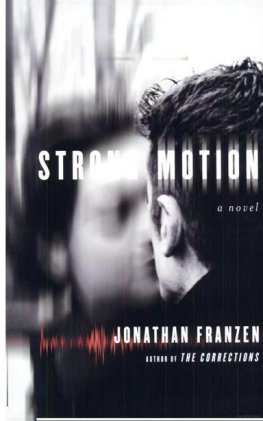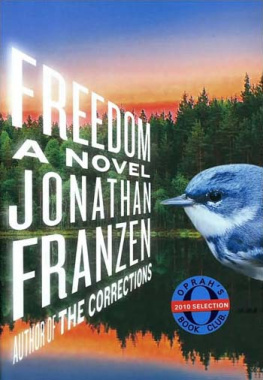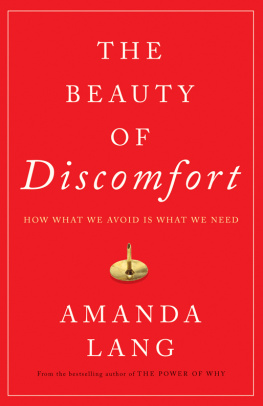Jonathan Franzen - The Discomfort Zone
Here you can read online Jonathan Franzen - The Discomfort Zone full text of the book (entire story) in english for free. Download pdf and epub, get meaning, cover and reviews about this ebook. City: Ney York, year: 2006, publisher: Farrar, Straus and Giroux, genre: Prose. Description of the work, (preface) as well as reviews are available. Best literature library LitArk.com created for fans of good reading and offers a wide selection of genres:
Romance novel
Science fiction
Adventure
Detective
Science
History
Home and family
Prose
Art
Politics
Computer
Non-fiction
Religion
Business
Children
Humor
Choose a favorite category and find really read worthwhile books. Enjoy immersion in the world of imagination, feel the emotions of the characters or learn something new for yourself, make an fascinating discovery.
- Book:The Discomfort Zone
- Author:
- Publisher:Farrar, Straus and Giroux
- Genre:
- Year:2006
- City:Ney York
- ISBN:918-0-312-94841-2
- Rating:3 / 5
- Favourites:Add to favourites
- Your mark:
- 60
- 1
- 2
- 3
- 4
- 5
The Discomfort Zone: summary, description and annotation
We offer to read an annotation, description, summary or preface (depends on what the author of the book "The Discomfort Zone" wrote himself). If you haven't found the necessary information about the book — write in the comments, we will try to find it.
The Discomfort Zone — read online for free the complete book (whole text) full work
Below is the text of the book, divided by pages. System saving the place of the last page read, allows you to conveniently read the book "The Discomfort Zone" online for free, without having to search again every time where you left off. Put a bookmark, and you can go to the page where you finished reading at any time.
Font size:
Interval:
Bookmark:
The Discomfort Zone
A Personal History
by
Jonathan Franzen
For Bob and Tom
HOUSE FOR SALE
THERED BEEN A STORM that evening in St. Louis. Water was standing in steaming black pools on the pavement outside the airport, and from the back seat of my taxi I could see oak limbs shifting against low-hanging urban clouds. The Saturday-night roads were saturated with a feeling of after-ness, of lateness the rain wasnt falling, it had already fallen.
My mothers house, in Webster Groves, was dark except for a lamp on a timer in the living room. Letting myself inside, I went directly to the liquor shelf and poured the hammer of a drink Id been promising myself since before the first of my two flights. I had a Viking sense of entitlement to whatever provisions I could plunder. I was about to turn forty, and my older brothers had entrusted me with the job of traveling to Missouri and choosing a realtor to sell the house. For as long as I was in Webster Groves, doing work on behalf of the estate, the liquor shelf would be mine. Mine! Ditto the air-conditioning, which I set frostily low. Ditto the kitchen freezer, which I found it necessary to open immediately and get to the bottom of, hoping to discover some breakfast sausages, some homemade beef stew, some fatty and savory thing that I could warm up and eat before I went to bed. My mother had been good about labeling food with the date shed frozen it. Beneath multiple bags of cranberries I found a package of small-mouth bass that a fisherman neighbor had caught three years earlier. Underneath the bass was a nine-year-old beef brisket.
I went through the house and stripped the family photos out of every room. Id been looking forward to this work almost as much as to my drink. My mother had been too attached to the formality of her living room and dining room to clutter them with snapshots, but elsewhere each windowsill and each tabletop was an eddy in which inexpensively framed photos had accumulated. I filled a shopping bag with the haul from the top of her TV cabinet. I picked another bags worth from a wall of the family room, as from an espaliered fruit tree. Many of the pictures were of grandchildren, but I was represented in them, too here flashing an orthodontic smile on a beach in Florida, here looking hungover at my college graduation, here hunching my shoulders on my ill-starred wedding day, here standing three feet away from the rest of my family during an Alaskan vacation that my mother, toward the end, had spent a substantial percentage of her life savings to take us on. The Alaskan picture was so flattering to nine of us that shed applied a blue ballpoint pen to the eyes of the tenth, a daughter-in-law, whod blinked for the photo and who now, with her misshapen ink-dot eyes, looked quietly monstrous or insane.
I told myself that I was doing important work by depersonalizing the house before the first realtor came to see it. But if somebody had asked me why it was also necessary, that same night, to pile the hundred-plus pictures on a table in the basement and to rip or slice or pry or slide each photo out of its frame, and then dump all the frames into shopping bags, and stow the shopping bags in cabinets, and shove all the photos into an envelope, so that nobody could see them if somebody had pointed out my resemblance to a conqueror burning the enemys churches and smashing its icons I would have had to admit that I was relishing my ownership of the house.
I was the only person in the family whod had a full childhood here. As a teenager, when my parents were going out, Id counted the seconds until I could take temporary full possession of the house, and as long as they were gone I was sorry they were coming back. In the decades since, Id observed the sclerotic buildup of family photographs resentfully, and Id chafed at my mothers usurpation of my drawer and closet space, and when shed asked me to clear out my old boxes of books and papers, Id reacted like a house cat in whom she was trying to instill community spirit. She seemed to think she owned the place.
Which, of course, she did. This was the house where, five days a month for ten months, while my brothers and I were going about our coastal lives, she had come home alone from chemotherapy and crawled into bed. The house from which, a year after that, in early June, she had called me in New York and said she was returning to the hospital for more exploratory surgery, and then had broken down in tears and apologized for being such a disappointment to everyone and giving us more bad news. The house where, a week after her surgeon had shaken his head bitterly and sewn her abdomen back up, shed grilled her most trusted daughter-in-law on the idea of an afterlife, and my sister-in-law had confessed that, in point of sheer logistics, the idea seemed to her pretty far-fetched, and my mother, agreeing with her, had then, as it were, put a check beside the item Decide about afterlife and continued down her to-do list in her usual pragmatic way, addressing other tasks that her decision had rendered more urgent than ever, such as Invite best friends over one by one and say goodbye to them forever. This was the house from which, on a Saturday morning in July, my brother Bob had driven her to her hairdresser, who was Vietnamese and affordable and who greeted her with the words Oh, Mrs. Fran, Mrs. Fran, you look terrible, and to which shed returned, an hour later, to complete her makeover, because she was spending long-hoarded frequent-flyer miles on two first-class tickets, and first-class travel was an occasion for looking her best, which also translated into feeling her best; she came down from her bedroom dressed for first class, said goodbye to her sister, who had traveled from New York to ensure that the house would not be empty when my mother walked away from it that someone would be left behind and then went to the airport with my brother and flew to the Pacific Northwest for the rest of her life. Her house, being a house, was enough slower in its dying to be a zone of comfort to my mother, who needed something larger than herself to hold on to but didnt believe in supernatural beings. Her house was the heavy (but not infinitely heavy) and sturdy (but not everlasting) God that shed loved and served and been sustained by, and my aunt had done a very smart thing by coming when she did.
But now we needed to put the place on the market in a hurry. We were already a week into August, and the houses best selling point, the counterbalance to its many defects (its tiny kitchen, its negligible back yard, its too-small upstairs bathroom), was its situation in the Catholic school district attached to the church of Mary, Queen of Peace. Given the quality of the Webster Groves public schools, I didnt understand why a family would pay extra to live in this district in order to then pay further extra for schooling by nuns, but there were a lot of things I didnt understand about being Catholic. According to my mother, Catholic parents from all over St. Louis eagerly awaited listings in the district, and families in Webster Groves had been known to pull up stakes and move just one or two blocks to get inside its boundaries.
Unfortunately, once the school year started, three weeks from now, young parents wouldnt be so eager. I felt some additional pressure to help my brother Tom, the executor of the estate, to finish his work quickly. I felt a different kind of pressure from my other brother, Bob, who had urged me to remember that we were talking about real money. (People knock $782,000 down to $770,000 when theyre negotiating, they think its basically the same number, hed told me. Well, no, in fact, its twelve thousand dollars less. I dont know about you, but I can think of a lot of things Id rather do with twelve thousand dollars than give it to the stranger whos buying my house.) But the really serious pressure came from my mother, who, before she died, had made it clear that there was no better way to honor her memory and validate the last decades of her life than to sell the house for a shocking amount of money.
Font size:
Interval:
Bookmark:
Similar books «The Discomfort Zone»
Look at similar books to The Discomfort Zone. We have selected literature similar in name and meaning in the hope of providing readers with more options to find new, interesting, not yet read works.
Discussion, reviews of the book The Discomfort Zone and just readers' own opinions. Leave your comments, write what you think about the work, its meaning or the main characters. Specify what exactly you liked and what you didn't like, and why you think so.












